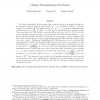Free Online Productivity Tools
i2Speak
i2Symbol
i2OCR
iTex2Img
iWeb2Print
iWeb2Shot
i2Type
iPdf2Split
iPdf2Merge
i2Bopomofo
i2Arabic
i2Style
i2Image
i2PDF
iLatex2Rtf
Sci2ools
108
click to vote
ECCC
1998
1998
Chinese Remaindering with Errors
The Chinese Remainder Theorem states that a positive integer m is uniquely speci ed by its remainder modulo k relatively prime integers p1;:::;pk, provided m < Qk i=1 pi. Thus the residues of m modulo relatively prime integers p1 < p2 < < pn form a redundant representation of m if m < Qk i=1 pi and k < n. This gives a number-theoretic construction of an \error-correcting code" that has been considered often in the past (see 41, 19, 35]). In this code a \message" (integer) m < Qk i=1 pi is encoded by the list of its residues modulu p1;:::;pn. By the Chinese Remainder Theorem, if a code-word is corrupted in e < n k 2 coordinates, then there exists a unique integer m whose corresponding code-word di ers from the corrupted word in at most e places. Furthermore, Mandelbaum 25, 26] shows how m can be recovered e ciently given the corrupted word, provided that the pi's are very close to one another. To deal with arbitrary pi's, we present a variant...
Related Content
| Added | 22 Dec 2010 |
| Updated | 22 Dec 2010 |
| Type | Journal |
| Year | 1998 |
| Where | ECCC |
| Authors | Oded Goldreich, Dana Ron, Madhu Sudan |
Comments (0)

